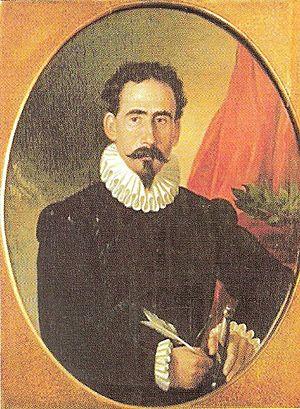Antonio Veneziano (poet) facts for kids
Quick facts for kids
Antonio Veneziano
|
|
|---|---|

Portrait of Antonio Veneziano by Salvatore Giaconia (1825-1899), Monreale City Hall
|
|
| Born | 7 January 1543 Monreale, Kingdom of Sicily
|
| Died | 19 August 1593 |
| Nationality | Italian |
| Occupation | poet |
| Known for | Sicilian poetry |
Antonio Veneziano (1543 – August 19, 1593) was an Italian poet. He mostly wrote in the Sicilian language. Many people think he was one of the greatest Sicilian poets. He was famous for his poems during his lifetime. He also wrote in Italian and Latin.
Who Was Antonio Veneziano?
Antonio Veneziano was born in Monreale, Sicily. This was a long time ago, when Sicily was ruled by Spain. He lived at the same time as a famous Spanish writer, Miguel de Cervantes.
An Unexpected Adventure
Around 1575, Antonio Veneziano had a big adventure. He was captured by Barbary pirates! He even shared a prison cell with Miguel de Cervantes. This happened when both were held captive in Algeria. Veneziano was released in 1579.
During his time in prison, he wrote his most famous work. It was a collection of poems called Celia. Cervantes reportedly admired these poems greatly. The word Celia means a joke or jest in Sicilian and Italian.
His Poetic Works
Antonio Veneziano wrote many other poems too. Some of his poems were funny or made fun of things. This is called satire. He died in Palermo.
All of his poems were collected and published in 1967. This book was called Ottave.
See also
 In Spanish: Antoniu Venezianu para niños
In Spanish: Antoniu Venezianu para niños
 | Anna J. Cooper |
 | Mary McLeod Bethune |
 | Lillie Mae Bradford |

